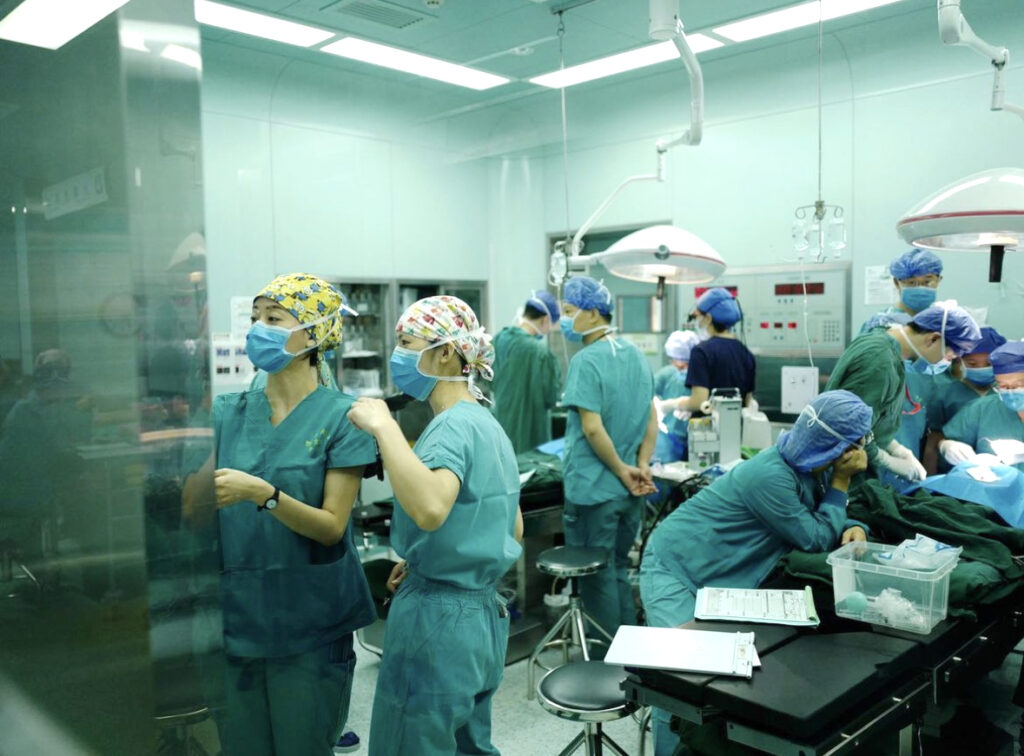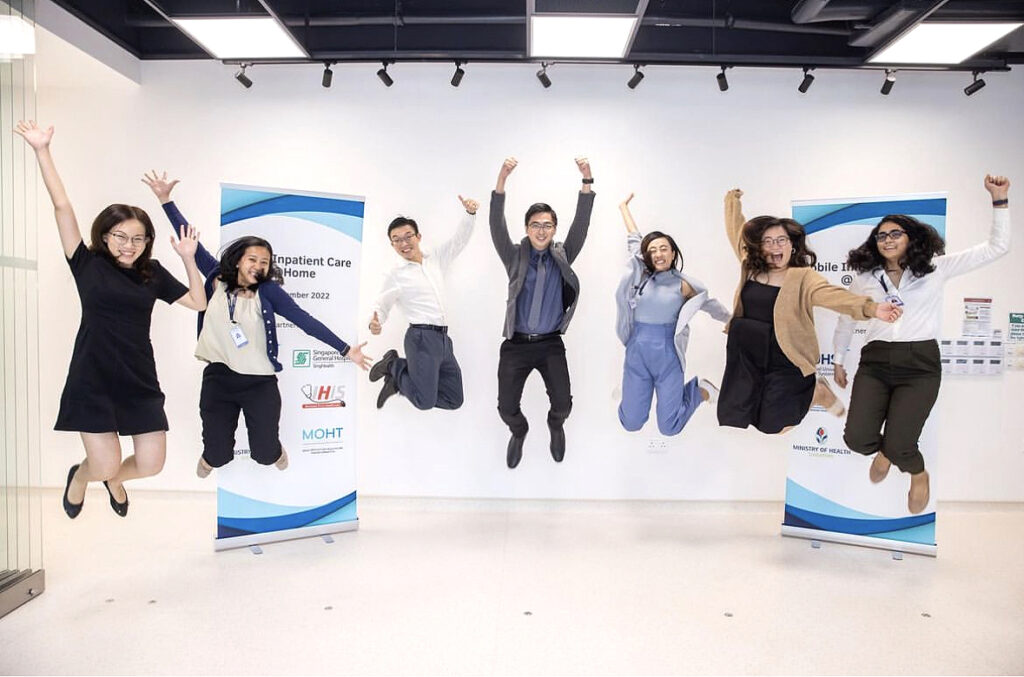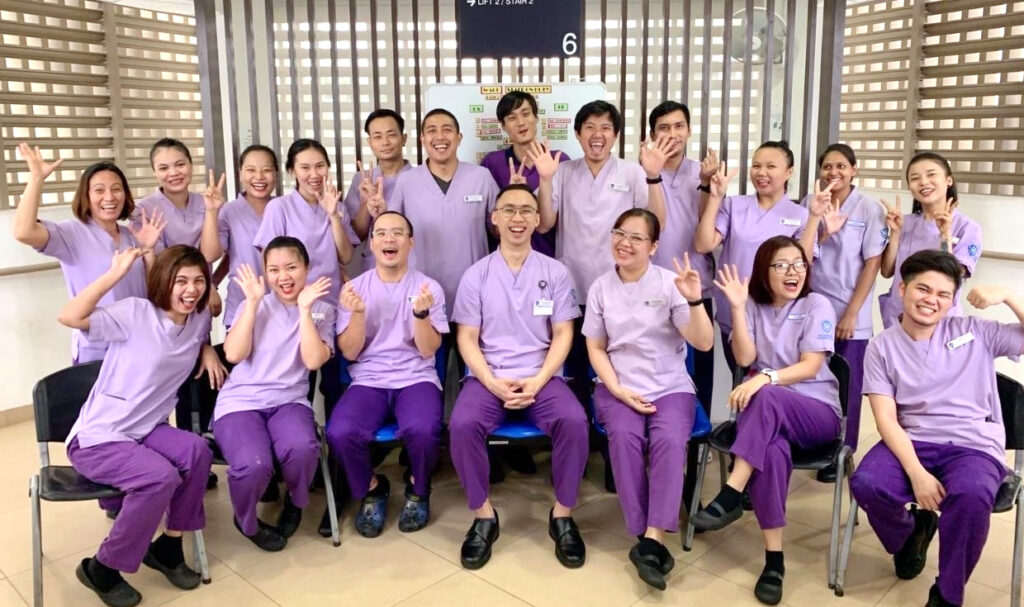Nurse Clinician, Nurse Manager, Nurse Educator, Nursing Researcher….Combined, two Alice Lee Centre for Nursing Studies (NUS Nursing), National University of Singapore Yong Loo Lin School of Medicine alumni have covered most of these bases—and a bit more. This Nurses’ Day, they share the twists and turns of their journeys and the significance of each milestone.
From Operating Theatre to Home: Michelle Tan is Helping to Bring Hospital Care Closer to Patients
Michelle Tan
NUS Nursing Alumna (Class of 2011)
Manager, MOH Office for Healthcare Transformation
Michelle’s Nursing Journey
Operating Theatre Nurse – Flight Attendant – Operating Theatre Nurse – Manager (Mobile Inpatient Care @ Home)
“I never had a tough day as an operating theatre nurse.”
Fresh out of NUS Nursing, Michelle’s first vocation was to be an operating theatre (OT) nurse. “During my time as an OT nurse, I developed a passion for helping people solve their problems directly. You have a tumour, we remove it. You have a broken bone, we fix it,” Michelle shared. “OT was very niche then. None of my NUS Nursing seniors did it, so I’m very grateful to the veterans who taught me on the job.”
With surgeries lasting long hours and even overnight, being an OT nurse can be challenging. “Sometimes they could go up to 12 or 13 hours—I remember having to wear a heavy radiation gown for 13 hours straight once, for an orthopaedic surgery. Other times, the patient could be in critical condition. You can imagine the stress and tension.”
Michelle continued, “In surgeries, we assist the surgeons; after surgeries, we are responsible for ensuring that the patient wakes up and gets transferred to their ward safely. Patient advocacy is also a huge part of the job. With patients asleep under anaesthesia, we need to think of and voice concerns to the surgeon.
“So even though it could be physically demanding, it’s very satisfying knowing that the patient will be well, and we are helping them tide over this difficult point in their life,” Michelle said. “I don’t think I really ever had a tough day as an OT nurse. In fact, if you asked me, I would rather do a 13-hour operation over sitting through a two-hour lecture—anytime!”

Michelle (first from left) volunteering as operating room nurse with Smiles Asia at Guilin, China.
“One operation can change the patient’s life.”
Amid her busy days, Michelle also took time to volunteer. This led her to join organisations such as Operation Smile and Khmer Sight Foundation on their medical missions for cleft lip and cataract operations.
“The experience was eye-opening; one of my most memorable operations was for a child with a very bad cleft lip. After the operations, we kept in touch with the parents—the child could smile, be bottle-fed, and more importantly, grow up healthy and go to school like any other child,” Michelle said.
“It’s gratifying to know that her life has changed forever because of this surgery,” Michelle reflected. “I also think volunteering is a very good way to rediscover your passion for healthcare—you get to do good while working with other like-minded healthcare professionals from around the world.”
“Pleasantries were unheard of in the operating theatre.”
Volunteering is not the only work that brought Michelle abroad in her career—she also took a break from Nursing in 2015 to work as a flight attendant with Singapore Airlines. “Back then, I wanted to learn more about communication because it’s such a big part of my work,” Michelle explained. “Where better to learn the skills than in a frontline customer-facing role prioritising communication?”
After two years, Michelle returned to Nursing—to apply what she learnt. “Before my stint as a flight attendant, I was taught to be procedural in the OT. For example, when handing equipment over, I would say, ‘sharp is coming’ or ‘suture is coming’. Direct. To the point.”
In contrast, Michelle’s exposure during her flying days emphasised pleasantries. “I remember the first time I used ‘please’ and ‘thank you’ in the OT—the doctor actually stopped and looked at me. He said, ‘I’ve never heard this in the last 20 years.’ By changing communication styles, surgeons become more receptive to my suggestions during surgery. Which is why the way we respond and the words we choose in the OT are so important.”
“In the future, there will be no hospitals in Singapore.”
Today, Michelle’s Nursing career has again taken her out of the OT—and into public health. Michelle recalled, “Three years after I graduated, my Assistant Director of Nursing then asked me, ‘Where do you envision yourself in the future?’”
Michelle’s answer? “I said, ‘There will be no hospitals in Singapore—and nobody has to come to the hospital for surgery. Instead, we will go to the patient’s home to do surgery.’” What sounded like a far-fetched dream nine years ago has come one step closer to reality.
Currently, Michelle is a Manager at the MOH Office for Healthcare Transformation (MOHT)—working on the Mobile Inpatient Care @ Home (MIC@Home) Sandbox. Under MIC@Home, patients receive hospital-level care at home through teleconsultations and home visits from the hospital care team.
“When I first heard about this project, everything flashed back, and I thought, ‘Why not? Let’s see if we can make this dream come true.’ That’s when I took the plunge.”
Will Michelle return to clinical Nursing someday? “Right now, I want to help make this care model a reality. I also hold a joint appointment with Yishun Health Medical Home as a clinical research coordinator. But never say never,” Michelle quipped.

Michelle (third from right) at MOHT’s first media launch.
From Student to Teacher: Tan Guang Rong is Inspiring Future Nurses
Tan Guang Rong
NUS Nursing Alumnus (Class of 2014)
Lecturer, NUS Nursing
Guang Rong’s Nursing Journey
Acute Care Nurse – Care Consultant (Agency for Integrated Care) – Community Care Nurse – NUS Nursing Lecturer
“When you talk about Nursing, people raise their eyebrows.”
For Tan Guang Rong, Nursing came into the picture when his late mother fell ill during his second year of polytechnic in Pharmaceutical Studies. In the hospital, Guang Rong was exposed to the healthcare team providing help and care around the clock, which planted the seeds of joining the industry. He said, “Watching the care team of doctors and nurses made me wonder what I could do to contribute to the healthcare industry.
“Coincidentally, second year of polytechnic is also a time when many people would start thinking about what they want to do after graduation—whether to start working or further their studies—so that was a pivotal point. After much reflection, I decided to give healthcare a try and help those in need.”
But there was just one small hitch—reactions from those around him. Guang Rong shared, “Whenever I mentioned that I was going to do Nursing in university, people started to raise their eyebrows and ask, ‘Why Nursing?’ For them, going into something like big pharma or biotech probably made more sense. But for me, it was a personal choice. And after explaining my reasons, most of them came round and gave their blessing.”
“I began to wonder how our patients are coping out there.”
As it turned out, making the jump from Pharmaceutical Sciences in polytechnic to NUS Nursing was seamless for Guang Rong. He said, “Both fields are grounded in science, so it wasn’t hard to cross over. In fact, I enjoyed the curriculum very much—I appreciated that it was so structured and well-planned.”
After graduation, Guang Rong joined the acute care sector, where he worked in the neurology and psychiatric care wards. “NUS Nursing definitely prepared me well in terms of skills and knowledge—enabling me to focus on gaining practical experience and developing clinical skills.
“But after three years, I started to wonder—what was it like out there? Are our patients coping well after discharge? I eventually decided to try the community care sector, and worked as a Care Consultant for the Agency of Integrated Care (AIC). Through matching patients with discharge services, I had a bird’s-eye view of care transition from institution to home and the support services available.”
“All of us might go into a nursing home some day.”
After a period of time working as a Care Consultant, Guang Rong began to miss direct patient contact. “While I had some interactions with patients, it was different,” Guang Rong explained. “In the course of my work at AIC, my curiosity about nursing homes was stirred—why are people apprehensive about nursing homes?
“Any one of us may need to stay in a nursing home some day—so why not start by helping to create the kind of care we would want to receive,” Guang Rong said. “Nonetheless, I had a bit of culture shock initially—expanded scope, adjustment to the collaborative and person-centred care approaches and to top off, tighter resources—but what struck me most was the relationships we formed with the residents.”
Different from acute hospital patients—most nursing home residents stay in the nursing homes for a long time. “The only time they discharge is if there’s a new care plan, or if they pass on. This means that the care team has plenty of opportunities to get to know residents—each with their own stories—beyond their illnesses. And on occasions when a resident lacks sufficient social support, the role of the care team becomes even more vital in supporting their psychosocial well-being.
“That is why I always tell my team that it’s the beginning of a new chapter for our residents when they come in, and it’s our privilege to journey with them,” said Guang Rong. Over time, Guang Rong developed a greater interest in gerontology, which led him to pursue a Master’s in Applied Gerontology at Nanyang Technological University.
“Nursing school is no place for loners.”
During his Master’s studies, Guang Rong came into contact with many passionate educators and practitioners in the field of ageing and education, which inspired him to consider Nursing education as his next career move. “I saw it as an opportunity to help shape the perception of young nurses about the community sector. As an educator, I could not only encourage their interest, but share my experience in the sector.”
Returning to NUS Nursing as a lecturer was nostalgic for Guang Rong—who as a student, never imagined that he would one day join the teaching team. “As an alumnus, I could relate to the students’ struggles with academic workload and clinical postings. That insight enables me to better support and guide them along—but nothing beats seeing them overcome their problems at the end of the term.”
Beyond imparting skills and knowledge in the NUS Nursing curriculum, Guang Rong makes sure to instil something he learnt himself as a student: “Always look out for one another. You are not alone in Nursing school or clinical posting—and if you could learn to lean on and lend support to one another, you’ll always get out on the other side stronger. That was something I vividly remember learning from my own teachers, and it continues to serve me well.”
On what’s next for him, Guang Rong said, “Maybe dive into the sociological aspects of ageing in Singapore, and hopefully do a PhD. But I am not quite done as an educator yet—I am still learning to help our students learn better.”

Guang Rong (centre, seated) with the nursing home care team.




